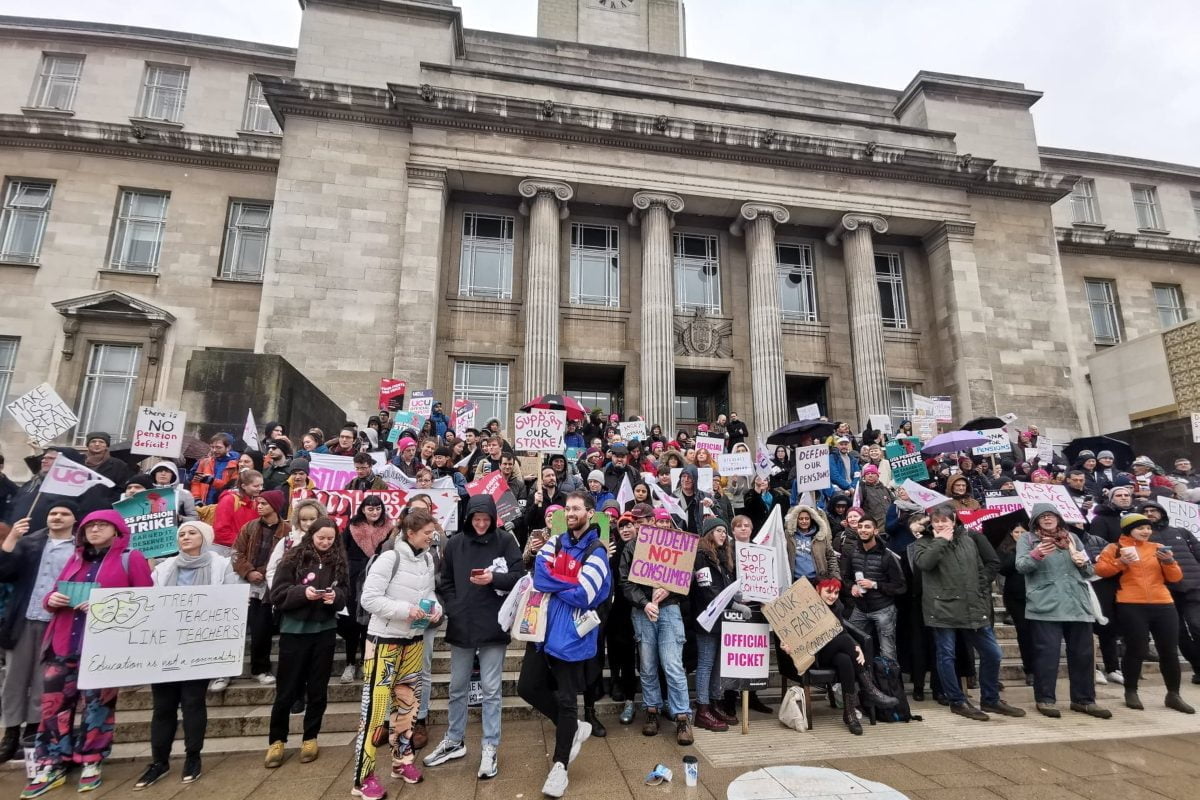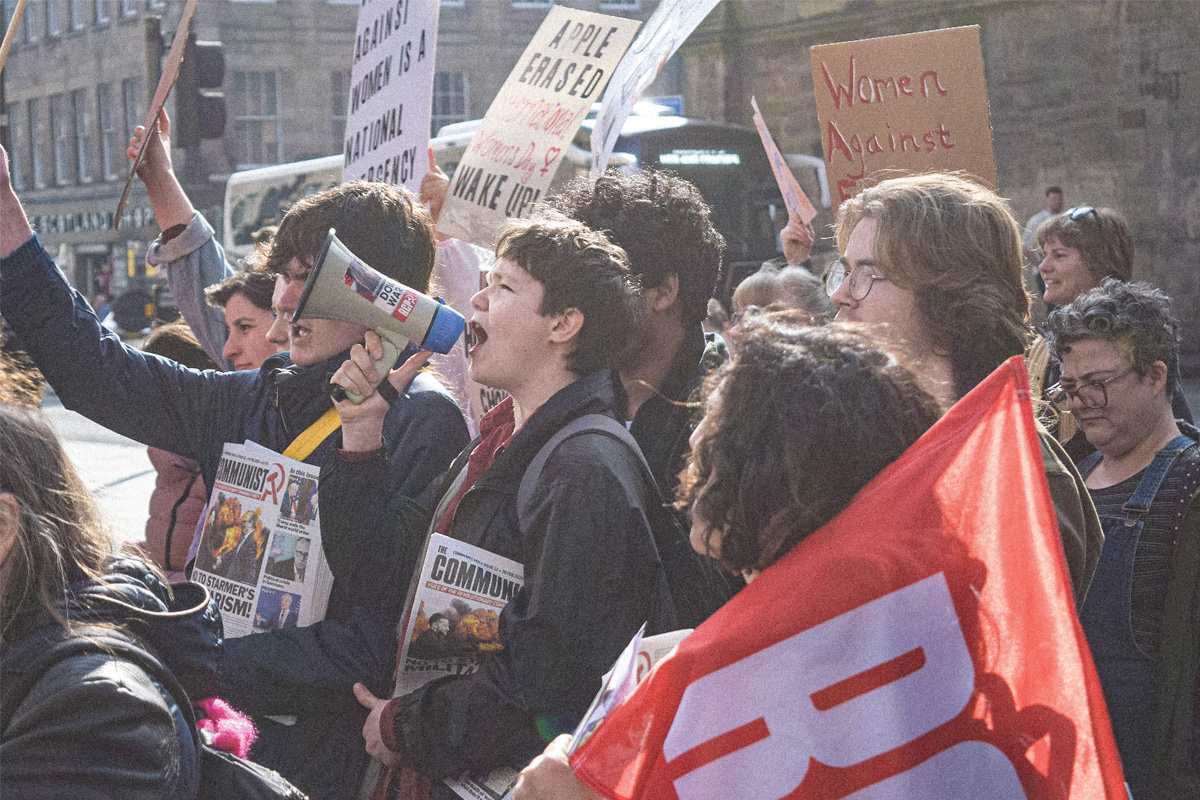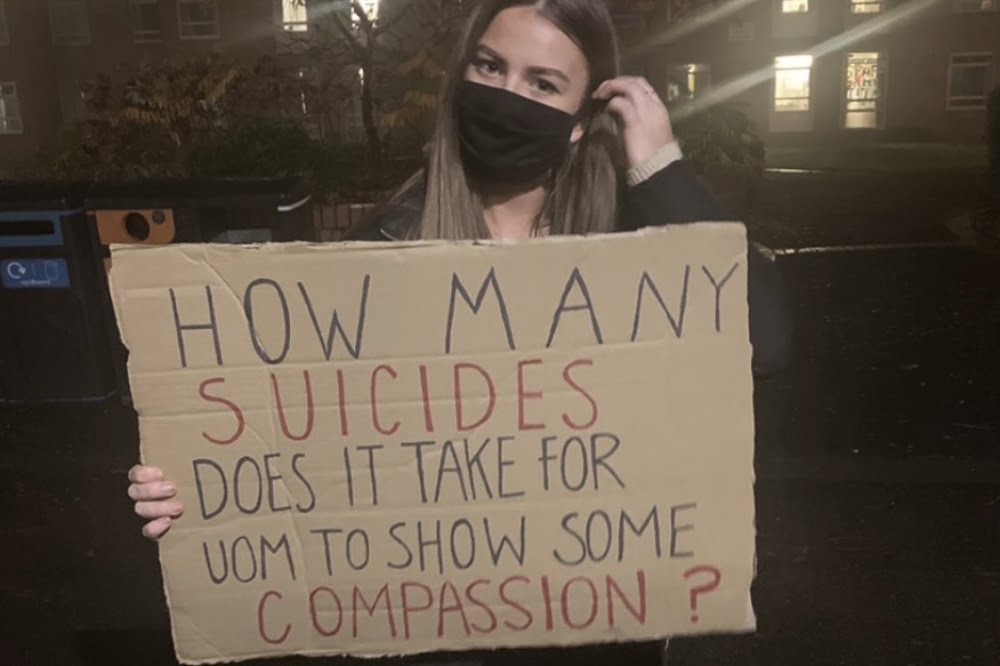UCU members in higher education are now in their third week of strike action, fighting for decent pay, pensions, working conditions, and equality. Marxist students have been mobilising to offer solidarity and support.
Strike action by UCU members is escalating over the next couple of weeks, with four days of strikes this week, and a full week of action starting next Monday. University bosses are refusing to budge over the UCU’s demands, however. Now more than ever, therefore, it is vital that students mobilise to support their lecturers.
The Marxist Student Federation has been active on campuses across the country, providing solidarity to striking staff, joining picket lines and protests, and taking part in the ‘teach-outs’ to discuss the root cause of the higher education crisis – the capitalist system.
Students and workers: unite and fight!
UCU members are determined to fight this struggle to the end
By a Sheffield UCU member
 Staff at 74 universities across the UK – including many post-92 institutions – are entering the third week of industrial action. With 21 days of strikes called, this is the biggest collective action ever seen in Britain’s higher education (HE) sector.
Staff at 74 universities across the UK – including many post-92 institutions – are entering the third week of industrial action. With 21 days of strikes called, this is the biggest collective action ever seen in Britain’s higher education (HE) sector.
The turnout on rainy, cold and windy picket lines has demonstrated the determination of members. Members have organised rotas and hot drinks for picketers. Student solidarity campaigns, meanwhile, provide moral support and music to sustain spirits.
We are here for the long run and there is a lot at stake. After eight days of strike last December, members are determined to move the employers on the USS pension dispute, as well as the ‘Four Fights’ dispute. The ‘Four Fights’ campaign seeks to address a decade of pay cuts; increasing pay inequalities along gender, ethnicity and disabilities lines; unrealistic workloads; and the resulting mental health crisis in the sector.
Marketisation and austerity have led to a shocking number of mental health related illnesses. At the University of Sheffield, for example, these increased from 50 per year a decade ago, to 800 in the last year alone. This is directly connected to ever-increasing workloads and increasing casualisation, which is rampant in the sector.
Up to 40% of the work done by professional services, teaching and research staff remains unpaid. 68% of research staff find themselves on fixed-term contracts for up to five years in a row – conveniently timed to leave them unemployed during the term breaks.
The scandal of zero-hours contracts does not halt at the gates of universities and colleges: 46% of universities and 60% of colleges have their teaching staff working on zero-hour contracts. The wage gaps for female, disabled, and BAME staff are an embarrassment for institutions that like to portray themselves as ‘progressive’, inclusive working and learning spaces.
Last December, employers refused to even negotiate on terms and conditions such as workload, pay and inequalities, claiming that there was nothing they could do to mitigate these worsening conditions. In January 2020, they presented a “final offer” that would cost them nothing and committed them to even less. Their “offer” of a “pay rise” of just 1.8% is an insult: in real terms, this is another cut that will hit the most precarious in the sector the hardest.
Last week, 86% of university employers refused to make another offer on the USS dispute. Only two vice chancellors voted to take on the recommendations of the independent evaluation committee’s report, which found in favour of UCU: the pension scheme is sustainable and payable, and there is no need to raise contribution rates. Any increase of those rates would mean further attacks on the most vulnerable within the scheme.
Tuition fees, meanwhile, are increasing every year. Students pay more for their degrees than ever before, and yet have fewer contact hours. Institutions would rather splash their billions on fancy new buildings, marketing campaigns, and overseas campuses than on students and staff.
What the UCU is asking for is the bare minimum. We need to win these disputes, link up with other unions in the education sector, and transform higher education to be run democratically by students and workers.
Staff and students mobilise in London to defend education
The UCU’s London branches came together for a rally and march on Wednesday 26 February to mobilise support for the strike and put pressure on management. Around 750 angry lecturers and staff marched through central London up to the Bank of England, joined by Marxist students from UCL, KCL, SOAS, LSE and Queen Mary’s University.
It is fitting that a march in support of such a strike ended at the heart of the City. The deteriorating conditions of university workers are a direct product of capitalism in crisis. Higher education staff – once a somewhat more privileged section of the working class – are now largely casualised, worked to the bone and at risk of immense pension cuts.
All of these attacks are rooted in the 2008 economic crash, which means that severe cuts are on the agenda across the board – with the exception of the pay and bonuses of the bosses and vice chancellors, of course!
This explains the outrage seen amongst HE workers and students alike on Wednesday’s march. Their sense of betrayal was captured in the well-echoed slogan: the money’s there; where’s our share?
The lecturers and staff are clearly determined, adamant that they have worked hard for fair wages, conditions and pensions, but are being taken for fools by the management. Many universities churn out ever greater profits; provosts and chancellors receive millions of pounds in bonuses and expenses. Meanwhile, students keep on paying more for an increasingly stretched-out education service. All of this while academic staff are being forced into a race to the bottom.
This all fits in with the general pattern under capitalism: despite the fact that their system is failing, the bosses have never been richer. It is the workers, youth, and poor who are being made to pay for this crisis.
This is why students must join such protests and join their lecturers on the picket lines. As one of the union representatives pointed out on the footsteps of the Bank of England, we are united in our struggle against capitalism itself.
But he also pointed out that the employers think they can just wear the unions out over time. The strike must keep on growing and gaining support if it is to succeed in all of its demands.
If this strike does succeed, it will be an immense blow to the business-like system under which universities are run. From there, we can achieve much more: free, quality education; and control of universities by staff and students.
Students and workers – unite and fight!
Reports from the picket lines
As the UCU strike continues, members of the Marxist Student Federation have been out at campuses around the country, joining other trade unionists and students in giving full support and solidarity to the strikers on the picket lines.
Sheffield
Today, we joined striking academic staff on the picket line at Sheffield Hallam University. We asked Camila, Christina and Jen why they were on the picket line, what their hopes for the strike/dispute were and the prospects for the future.
Camila: “Simply put, I’m fed up with seeing my colleagues signed off sick with stress-related illnesses because of our workloads. The strikes mean we can keep growing the Hallam UCU branch, and give staff and members confidence that collectively we’ve got their back, and for me that’s a small but significant win.”
Christina: “I’ve sat down and calculated the hours I work versus what is actually on my work plan and there is such a huge gap, we have to strike! It’s for the students, we’re fighting for the students and for the sake of their education. Our work plans need to reflect what we actually do but the university management just keep sneaking in additional responsibilities. I hope as a result of the strike our work is actually acknowledged and compensated.”
Jen: “I’ve seen a lot of people of my generation who I work with having to live on short-term precarious work contracts, with increasingly lower hourly wages because of their workloads. They’re coming into a sector with huge racial and gender pay inequalities, where they have no access to sick leave, paternity leave and are forced to move all across the country. We’re only paid for nine months of the year and for three months we’re forced to find temporary work to make ends meet.”
“It’s the precarity and pay gaps which have brought me out on the picket line today. I’m lucky enough to have secure employment at the moment and it’s important for members of staff like me in those positions to come out on strike to support precarious workers who are often the ones shouldering the burden of fighting back. I want universities to commit to concrete action that will give people secure jobs which pay fairly. It’s hard to know what this will look like because of how workers are treated in our society but that is my hope.”
Later we spoke to another striker, Steffan who talked about the issue of casualisation:
“My name’s Steffan, I’m a postdoctoral researcher in the History department and I’m also the anti-casualisation officer for Sheffield UCU. I finished my PhD in 2017 and this is the fourth Higher Education institution I’ve worked at since then: two of them on hourly-paid contracts, two of them on fixed-term contracts. My contract ends here in a year and a half and I don’t know where I’m gonna be after that. Casualisation is an issue that affects increasing numbers of people in our union. Over half of academic staff in the UK are now on casualised contracts of some kind, and most teaching in UK universities is done by casualised staff.”
“I think a lot of students don’t realise they’re often being taught by people on hourly-paid, zero hours contracts. We’re really not asking for much from the employers on this, they just need to agree to a national negotiating framework and they’ve been really reluctant to negotiate unless we go on strike. That’s why we’re out here, soaking wet on a Thursday morning!”
SOAS
At SOAS, the mood at the picket lines was excellent. Both UCU and union picketers are determined, energised and looking upwards. Teach outs are met with enthusiasm by both students and striking workers, with plenty of participation going on.
The workers at SOAS are in an especially precarious situation, as years of financial blunders by management have pushed the institution to the brink of bankruptcy. Three weeks ago it was announced that SOAS would be discontinuing research leave, threatening to sack en masse all teaching assistants and other academic workers in precarious contracts.
However, this has not discouraged workers. In fact it has emboldened them to take this action extremely seriously and prove to management that they are a force to be reckoned with.
Among the topics covered by SOAS professors during teach-outs are the left movement in Latin America, and managerialism and the struggle of precariousness in higher education – all taught in an engaging manner, which reflects the invaluable expertise of striking staff.
There have been barely any students crossing the picket line. In fact, large groups of students are constantly at the picket line, providing assistance and showing their solidarity with the people that provide their education.
SOAS is rising up to the task and honouring its radical reputation!
UCL
Despite the weather battering from Storm Ellen, the mood at UCL has remained determined and new layers of staff have come out on the picket lines. As one striker said:
“Some of the picketers are concerned about the duration of the strike, but they feel determined to plough on because the issues they are facing have only got worse since the last strike. Pay and casualisation are making life harder. There is a sense of decisiveness about this strike – either things can get a lot worse, or we can mark a strong victory.”
The result is a clear desire to go further in disrupting the university. Many have learnt from the traditions of the IWGB – a union of precarious workers that held a day of joint action with the UCU back in December. The radical energy that IWGB workers display through rallies and workplace disruption is now echoed among the lecturers and staff, who want to mobilise much larger numbers for the picket lines and win over students to their side.
The radicalism of the strikers can also be found in the strong urge for political discussion. Informally and during teach-outs, discussions were held about the general strike in France; the world political situation; and the crisis of capitalism – upon which the attacks on workers’ living conditions are based in the first place.
The first teach-out tackled the question of marketisation of the universities. This is a point that lecturers have used in particular to talk to students about the strikes. These are not a struggle of the ‘selfish academics for personal improvement’, but are a broader struggle of the working class for quality education and better living conditions. As one UCU member put it:
“Management are particularly reluctant to come to the negotiating table because today’s strike isn’t about tinkering at the edges, but a united struggle against the whole way that universities operate, i.e. as businesses.”






